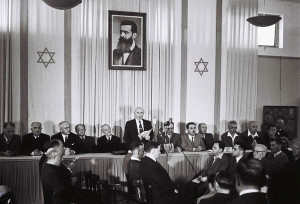
14 May 1948
Israeli Ministry of Foreign Affairs, The Declaration of the Establishment of the State of Israel, May 14, 1948, https://www.gov.il/en/pages/declaration-of-establishment-state-of-israel.
No draft declaration of Independence existed until April 1948. Using the American Declaration of Independence and the U.S. Constitution as philosophical frameworks, a small group of attorneys and politicians pieced together Israel’s Declaration of Independence. Other important political decisions pertaining to Jewish statehood were left until the last minute: the location of the State’s capital, its final name, and how to bring together several Jewish military organizations under one command. Military operations, particularly those around the Jewish settlement at Kfar Etzion, south of Jerusalem, diverted attention from final decisions about these matters. Also pressing on David Ben-Gurion, the head of the Jewish Agency and future first Prime Minister of Israel, was the request by President Truman’s White House for a formal written request for recognition.
On Friday, May 14, after some debate, the National Council, established to oversee the political needs of the Jewish community in Palestine, voted to accept the final text of the Declaration. That afternoon at 4 pm, David Ben-Gurion, head of the National Council, read the Declaration at the Tel Aviv Museum. Without electricity in Jerusalem, few there heard Ben-Gurion’s words or the singing and playing of ‘Hatikvah,’ Israel’s national anthem. That morning, Ben-Gurion, uncertain about the coming war with Arab states, had his secretary secure a safety deposit box at a local bank so that the Declaration could be immediately placed there for safekeeping.

The Declaration was a synopsis of Jewish history to 1948 and a statement of Israel’s intent toward its inhabitants, neighbors, and the international community. It was divided into four parts: 1) a biblical, historical, and international legal case for the existence of a Jewish state in the Land of Israel; 2) the self-evident right of the Jewish people to claim statehood; 3) the actual declaration of statehood; and 4) statements about how the state would operate, including an enumeration of citizen rights. In keeping with the UN Resolution that provided international legitimacy for Jewish and Arab states in Palestine, the requirement to have a constitution was stated. Israel’s objective to institute a constitution was postponed indefinitely in June 1950.

Noteworthy similarities and differences exist between the American and Israeli Declarations of Independence. Both declarations assert independence and the right of their populations to control their own destinies, free from legislative impositions and despotic abuses. In the Israeli case, however, immediate past history was included, and it reflected earlier Jewish catastrophes and the prospects of potential physical annihilation. Both declarations sought self- determination, liberty, and freedom derived their claims based on human and natural rights, promised safeguards for the individual, and proclaimed an interest in commerce or economic growth.
The Israeli Declaration of Independence contained a list of historical claims to the land of Israel. The Declaration cited benchmark historical events when the international community sanctioned the Jewish state’s legitimacy, particularly the acknowledgement to build a national home given by the League of Nations (1922) and by the United Nations (1947) to establish a Jewish state. While there were skirmishes going on between Americans and the British when the American Declaration of Independence was signed in 1776, when Israel declared its independence it was in the midst of a full-fledged war for survival with the local Arab population and surrounding Arab states. The on-going war notwithstanding, the Israeli Declaration of Independence includes a declaratory statement offering “peace and amity” to its neighbors and the request “to return to the ways of peace.” Both declarations made reference to a higher authority: the Israeli Declaration of Independence does not mention religion, but it closes with the phrase “with trust in the Rock of Israel [Tzur Yisrael].”1 The choice of this phrase was Ben-Gurion’s verbal compromise, made to balance strong secular and religious pressures. Any precise mention of religion might have required mention of religious practice, which could have created enormous social fragmentation in the early fragile years of the state. By contrast, the American Declaration of Independence appealed to the “Supreme Judge, protection of the Divine.”

What impact did the Israeli Declaration of Independence have? Coupled with the attack by Arab fighters on Israel’s establishment, it served as a rallying point for Jews in Palestine and in the Diaspora. The Declaration of Independence was signed by representatives of all existing political parties. It appealed to Diaspora Jews to immigrate to Israel. Later, when a constitution was not written, the phrase “guaranteeing freedom of religion, conscience, language, education, and culture,” became the foundation for protected civil liberties in Israel. In the 1990s when the Israeli Supreme Court engaged in activism to protect civil rights of all Israel’s citizens, the Declaration of Independence was cited as the philosophical bedrock justifying judicial activism. In 2023, when a majority of Israeli society protested against an intended judicial overhaul that would increase the power of a sitting parliament over the courts, weekly in public protests, the Israeli public reiterated the Declaration’s centrality against generating a possible imbalance between the courts and the parliament. Eight hours after Ben- Gurion read the Declaration of Independence in 1948, the Egyptian Air Force dropped its first bombs on the outskirts of Tel Aviv. Israel’s War of Independence lasted until early 1949, with multiple wars and domestic crises ensuing over 76 years. Through it all, the Declaration remained the country’s philosophical bedrock, explicated in the country’s Basic Laws, with the country remaining without a written constitution.
-Ken Stein, May 2024
The Land of Israel was the birthplace of the Jewish people. Here, their spiritual, religious, and national identity was formed. Here, they achieved independence and created a culture of national and universal significance. Here, they wrote and gave the Bible to the world.
Exiled from Palestine, the Jewish people remained faithful to it in all the countries of their dispersion, never ceasing to pray and hope for their return and the restoration of their national freedom.
Impelled by this historic association, Jews strove throughout the centuries to go back to the land of their fathers and regain their Statehood. In recent decades, they returned in their masses. They reclaimed the wilderness, revived their language, built cities and villages, and established a vigorous and ever-growing community, with its own economic and cultural life. They sought peace yet were prepared to defend themselves. They brought the blessings of progress to all inhabitants of the country.
In the year 1897, the First Zionist Congress, inspired by Theodor Herzl’s vision of the Jewish State, proclaimed the right of the Jewish people to national revival in their own country.
This right was acknowledged by the Balfour Declaration of November 2, 1917, and reaffirmed by the Mandate of the League of Nations, which gave explicit international recognition to the historic connection of the Jewish people with Palestine and their right to reconstitute their national home.
The Nazi holocaust, which engulfed millions of Jews in Europe, proved anew the urgency of the reestablishment of the Jewish state, which would solve the problem of Jewish homelessness by opening the gate to all Jews and lifting the Jewish people to equality in the family of nations.
The survivors of the European catastrophe, as well as Jews from other lands, proclaiming their right to a life of dignity, freedom and labor, and undeterred by hazards, hardships, and obstacles, have tried unceasingly to enter Palestine.
In the Second World War, the Jewish people in Palestine made a full contribution in the struggle of the freedom-loving nations against the Nazi evil. The sacrifices of their soldiers and the efforts of their workers gained them title to rank with the peoples who founded the United Nations.
On November 29, 1947, the General Assembly of the United Nations adopted a Resolution for the establishment of an independent Jewish State in Palestine, and called upon inhabitants of the country to take such steps as may be necessary on their part to put the plan into effect.
This recognition by the United Nations of the right of the Jewish people to establish their independent state may not be revoked. It is, moreover, the self-evident right of the Jewish people to be a nation, like all other nations, in its own sovereign state.
Accordingly, we, the members of the National Council, representing the Jewish people in Palestine and the Zionist movement of the world, met together in solemn assembly today, the day of the termination of the British Mandate for Palestine, and by virtue of the natural and historic right of the Jewish people and of the resolution of the General Assembly of the United Nations, hereby proclaim the establishment of the Jewish State in Palestine, to be called Israel.
We hereby declare that as from the termination of the Mandate at midnight, this night of the fourteenth to the fifteenth of May 1948, and until the setting up of the duly elected bodies of the State in accordance with a Constitution, to be drawn up by a Constituent Assembly not later than the first day of October 1948, the present National Council shall act as the Provisional State Council, and its executive organ, the National Administration, shall constitute the Provisional Government of the State of Israel.
The State of Israel will be open to the immigration of Jews from all countries of their dispersion; will promote the development of the country for the benefit of all its inhabitants; will be based on the precepts of liberty, justice, and peace taught by the Hebrew Prophets; will uphold the full social and political equality of all its citizens, without distinction of race, creed, or sex; will guarantee full freedom of conscience, worship, education, and culture; will safeguard the sanctity and inviolability of the shrines and Holy Places of all religions; and will dedicate itself to the principles of the Charter of the United Nations.
The State of Israel will be ready to cooperate with the organs and representatives of the United Nations in the implementation of the resolution of the assembly of November 29, 1947, and will take steps to bring about the Economic Union over the whole of Palestine.
We appeal to the United Nations to assist the Jewish people in the building of its State and to admit Israel into the family of nations.
In the midst of wanton aggression, we yet call upon the Arab inhabitants of the State of Israel to return to the ways of peace and play their part in the development of the State, with full and equal citizenship and the representation in all its bodies and institutions, provisional or permanent.
We offer peace and amity to all the neighboring states and their peoples, and invite them to cooperate with the independent Jewish nation for the common good of all. The State of Israel is ready to contribute its full share to the peaceful progress and development of the Middle East.
Our call goes out to the Jewish people all over the world to rally to our side in the task of immigration and development and to stand by us in the great struggle for the fulfillment of the dream of generations — the redemption of Israel.
With trust in the Rock of Israel, we set our hand to this Declaration, at this Session of the Provisional State Council, in the city of Tel Aviv, on this Sabbath eve, the fifth of Iyar 5708, the fourteenth day of May 1948.
